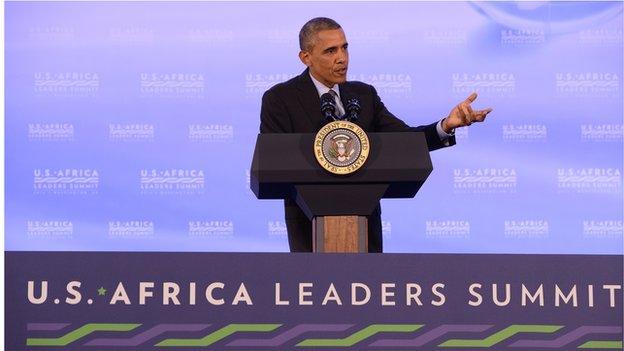China media: US-Africa summit
- Published

Media are suspicious of the US president's plans for co-operation with Africa
Chinese media point out that the US is "playing catch-up" in Africa as the first ever US-Africa summit ended in Washington on Wednesday, and warn the White House not to "monopolise" the continent.
The meeting was attended by some 40 African leaders. US President Barack Obama hailed a new emerging Africa, while US firms pledged $37bn (£33bn) in investment during the meeting.
Papers in China have been following the event closely, recalling that Beijing has often been criticised for "colonising" Africa with its economic projects.
Noting that the US has "never stopped targeting China", the Global Times, external observes that the US is now "seemingly following in China's footsteps".
The paper says that China has "no wild ambitions on the African continent" and adds that Beijing "does not feel threatened" by the "warming US-African ties".
"The whole world has to admit that China has been the biggest boost in shifting global attention back to Africa. Without China's rapidly growing co-operation with Africa, many Western countries would probably still be dismissing Africa's massive potential," says the paper.
He Wenping, an expert on African affairs, tells the Chinese edition, external of the paper that the US should not monopolise the African market.
"It will not benefit the development of Africa and Beijing-Washington ties if the US… engages in a malignant competition with China," says the pundit.
An article in the state-run China Net, external points out that Washington's intention is to use the summit to compete more successfully with countries like China, India and Japan that have already set foot in the continent.
It says that the US is trying to transform itself from an aid provider to an economic partner, and to "position itself as the big brother in African economic development". China Net warns, however, that no one should try to "conquer" the continent.
"It is unimaginable that any country or region is able to solve the massive problems of Africa on their own. It is wishful thinking for anyone who hopes to keep Africa for themselves, for their self-interest, by undermining others," it points out.
Fighting corruption
Papers continue to focus on the government's anti-graft effort after the recent news that former security chief Zhou Yongkang is being investigated for "serious disciplinary violation".
Mr Zhou headed China's Ministry of Public Security and was a member of the top decision-making body, the Politburo Standing Committee.
"The verdict on Mr Zhou's case was more or less concluded since the end of last year, but its implementation had to be carefully planned," a commentary in the People's Daily, external reveals.
The paper points out that China's new leadership fought a major battle against corruption by targeting Zhou Yongkang.
The article adds that there are "three wars to be fought after Zhou's case", the first being establishing the rule of law, which will be the theme of October's plenary session of the Central Committee of the ruling Communist Party.
"Many thought that the discussion on the rule of law will be delayed till the next term of government, or at least until next year, but now we know that the current leadership is seizing every minute… The fight against corruption does not end here, it will continue," People's Daily writes.
It adds that improving the efficiency of the market economy and ensuring fairness with no cronyism is the second war that needs to be fought, noting that "the monopoly of state-owned enterprises will have to go".
"The third war is the peaceful rise of China and ensuring that it has the space for survival", concludes the daily.
And finally, religious officials and experts are calling for the establishment of a Chinese Christian theology that can adapt to the country's national tradition.
According to the China Daily, external, between 23-40 million Protestants live in the country and they could account for up to 3% of the population.
Wang Zuoan, director of the State Administration for Religious Affairs, is quoted by the paper as saying that Chinese Christian theology should be compatible with the country's path to socialism.
"The creation of a Chinese Christian theology should adapt to China's national condition and integrate with Chinese culture," he argued at a seminar on the Sinicisation of Christianity held in Shanghai.
Writing in the China Ethnic News, external, Zhuo Xinping, president of the World Religions Research Centre at the Chinese Academy of Social Sciences, adds that it is essential for all religions in China, including Buddhism, Christianity and Islam, to be sinicised, so they could "integrate and adapt better" into Chinese society.
BBC Monitoring, external reports and analyses news from TV, radio, web and print media around the world. For more reports from BBC Monitoring, click here. You can follow BBC Monitoring on Twitter, external and Facebook, external.